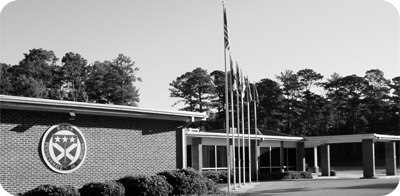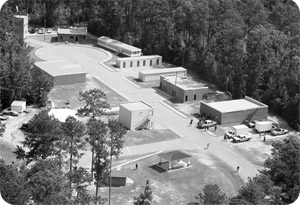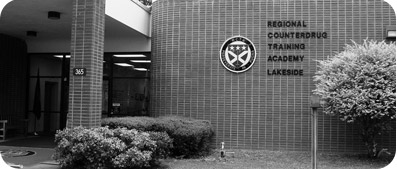History of the Regional Counterdrug Training Academy
 |
The Regional Counterdrug Training Academy (RCTA), located at Naval Air Station (NAS), Meridian, MS, is a congressionally funded training facility operated by the Mississippi National Guard Counterdrug Program. The RCTA was established to provide counterdrug (CD) training to members of Federal, State, tribal, or local law enforcement agencies (LEAs), Community Based Organizations (CBOs), and Military members (when applicable) with tuition free instruction on drug interdiction and counterdrug activities, and drug demand supply, reduction and prevention techniques. |
The RCTA was initially started under the Gulf States Counterdrug Initiative (GSCI). The purpose of the GSCI was "to identify resources, services, and support that can be legitimately provided by Department of Defense (DOD) components and agencies to support counterdrug activities along the U.S. southern coastal region"
Initially sponsored by law enforcement, the RCTA was also supported by six U.S. Senators, nineteen U.S. Representatives, and three state Governors heavily endorsing the GSCI proposal. One of the provisions of the GSCI document was a request by the Alabama, Louisiana, and Mississippi senior drug law enforcement agencies (DLEAs) to establish a counterdrug training academy with the mission of training law enforcement officers in counterdrug skills. The Academy mission was initially focused on the three requesting states, but in 1996, the state of Georgia became an official member of the GSCI. In 2000, the State of Tennessee was also admitted.
The RCTA provides training to law enforcement agencies throughout the U.S., including the National Guardsmen involved in counterdrug support missions. The primary focus is the five supported states (AL, GA, LA, MS & TN). This training is provided at no cost to the law enforcement officers or agencies. The only cost incurred by the agency is the transportation to and from the RCTA. National Guard & DOD personnel do not incur a tuition cost, but are responsible for their own per diem and travel.
Based upon the LEA request for DOD "support" (defined as funding, administrative, logistical, equipment, personnel, etc.), and with guidance and resources provided by the Office of the Secretary of Defense (OSD) Coordinator for Drug Enforcement Policy and Support, and the National Guard Bureau (NGB), the Mississippi National Guard accepted the mission of establishing a regional training center outlined in the GSCI document.
Initially, it was decided that the training center would be located on the Naval Air Station in Meridian, MS. A decision was made to renovate the former Officers Club and make it the home of the new “Regional Counterdrug Training Academy.” A military commandant, Lieutenant Colonel James P. Hills, was appointed in March 1992. His immediate mission was to coordinate with the law enforcement community, the U.S. Navy, National Guard Bureau, and the Department of Defense to establish a training center to meet the needs of the law enforcement officers who would attend.
Also in March of 1992, a Board of Representatives was selected to help develop academic policy, monitor operations, create a curriculum, and provide support in promoting the RCTA. The Board of Representatives consisted of one representative from the senior law enforcement agency in the member states, the NGB Counterdrug Chief, and the Mississippi National Guard Adjutant General.
| Due to the length of time required to renovate the Officers Club, and due to the immediate need for training, a temporary classroom was established in the ballroom of the Combined Bachelor's Quarters (CBQ), NAS Meridian. Two excess mobile homes were obtained at no charge from the Army Corps of Engineers, and served as administrative and logistics space for the RCTA. |
|
With the signing of the Inter-Service Support Agreement with the U.S. Navy, and additional support staff on board, the first class was conducted at the RCTA in September of 1992.
In October of 1993, Colonel Stephen L. Goff became the second Commandant of the RCTA. The new facilities were opened in a ribbon-cutting ceremony on October 19, 1994. In January of 1998, Colonel James P. Hills returned to assume command of the RCTA. In July of 1998 the Academy opened its new Lakeside facility on NAS Meridian. This building, which was also a former Officers Club, provided additional office space plus three additional classrooms. Sequentially, below is a list of the former to current Commandants:
2001-2002 Colonel Robert E. Pierce
2002-2004 Colonel Sidney E. McDaniel
2004 Colonel Robert E. Pierce
2004-2008 Colonel Danny Pepper
2008-2012 Colonel Deborah Coleman
2012 - 2015 Colonel Jerry L. Bratu
2015 - 2018 Lieutenant Colonel Gary L. Crist
The current RCTA Commandant, Lieutenant Colonel James B. McGraw was selected in in 2018 and also serves in a dual-hat capacity as the Counterdrug Coordinator over the Mississippi National Guard’s Counterdrug Task Force (CDTF). The CDTF provides operational mission support to the drug law enforcement agencies within the state of Mississippi.
 |
The RCTA utilizes a “Cops teaching Cops” training philosophy that emphasizes hands-on training and demands a secure field training facility. This type of training led to the RCTA designing and constructing a nine-building field-training facility for students to practice what they learn in the classroom. |
NAS Meridian provided students from the Navy Technical Training Center, SEABEE detachment, and technical assistance from the Public Works department. The facility was opened after its completion in the fall of 1995. Since then, a mobile home, a UH-1 helicopter hull, and a 12-bay K-9 kennel have been added to increase the effectiveness and the reality of the training offered.
Since the first class began in September 1992, over 130,000 officers have graduated in over 50 different subjects taught at the RCTA. The target audience is state, county, and municipal uniformed officers and conventional narcotics investigators, with the primary focus on case-makers (street level). The RCTA is the longest running Counterdrug training centers of the five that exist.
The others are: the Multi-Jurisdictional Counterdrug Task Force Training in St Petersburg, FL; the Northeast Counterdrug Training Center at Fort Indiantown Gap, Pennsylvania; the Midwest Counterdrug Training Center at Camp Dodge, Iowa; and the Western Regional Counterdrug Training Center at Camp Murray, Washington.
